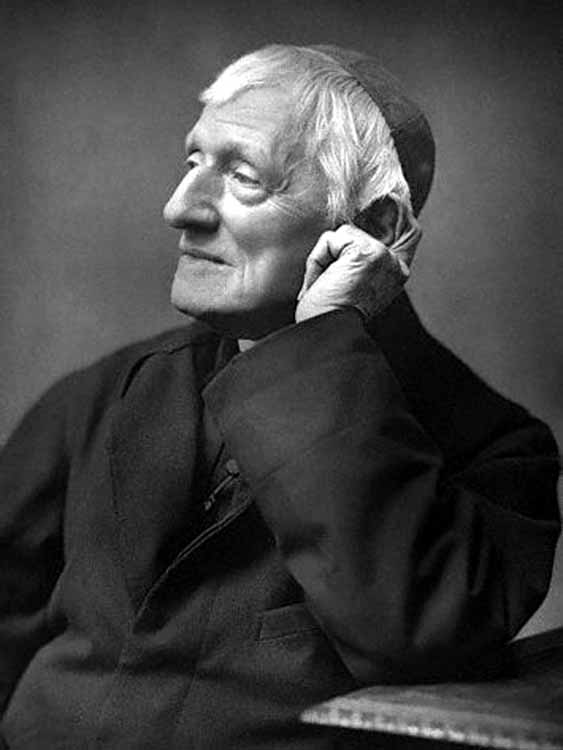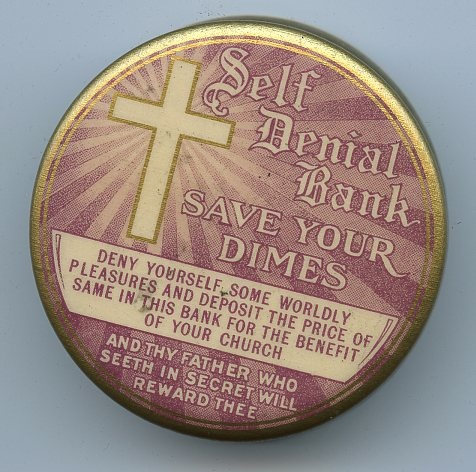Advent and self-denial
Related pages
The Awkwardnes of Advent
BLESSED JOHN HENRY CARDINAL NEWMAN
Rise up then in the morning with the purpose that (please God) the day
shall not pass without its self-denial.

. . . If, then, a person asks how he is to know whether he is dreaming on in
the world's slumber, or is really awake and alive unto God, let him first
fix his mind upon some one or other of his besetting infirmities. Every one
who is at all in the habit of examining himself, must be conscious of such
within him. Many men have more than one, all of us have some one or other;
and in resisting and overcoming such, self-denial has its first employment.
One man is indolent and fond of amusement, another man is passionate or
ill-tempered, another is vain, another has little control over his tongue;
others are weak, and cannot resist the ridicule of thoughtless companions;
others are tormented with bad passions, of which they are ashamed, yet are
overcome. Now let every one consider what his weak point is; in that is his
trial. His trial is not in those things which are easy to him, but in that
one thing, in those several things, whatever they are, in which to do his
duty is against his nature.
Never think yourself safe because you do your duty in ninety-nine points; it
is the hundredth which is to be the ground of your self-denial, which must
evidence, or rather instance and realize your faith. It is in reference to
this you must watch and pray; pray continually for God's grace to help you,
and watch with fear and trembling lest you fall. Other men may not know what
these weak points of your character are, they may mistake them. But you may
know them; you may know them by their guesses and hints, and your own
observation, and the light of the Spirit of God. And oh, that you may have
strength to wrestle with them and overcome them!
Oh, that you may have the wisdom to care little for the world's religion, or
the praise you get from the world, and your agreement with what clever men,
or powerful men, or many men, make the standard of religion, compared with
the secret consciousness that you are obeying God in little things as well
as great, in the hundredth duty as well as in the ninety-nine! Oh, that you
may (as it were) sweep the house diligently to discover what you lack of the
full measure of obedience! for be quite sure, that this apparently small
defect will influence your whole spirit and judgment in all things.

Be quite sure that your judgment of persons, and of events, and of actions,
and of doctrines, and your spirit towards God and man, your faith in the
high truths of the Gospel, and your knowledge of your duty, all depend in a
strange way on this strict endeavour to observe the whole law, on this
self-denial in those little things in which obedience is a self-denial. Be
not content with a warmth of faith carrying you over many obstacles even in
your obedience, forcing you past the fear of men, and the usages of society,
and the persuasions of interest; exult not in your experience of God's past
mercies, and your assurance of what He has already done for your soul, if
you are conscious you have neglected the one thing needful, the "one thing"
which "thou lackest," — daily self-denial.
 But, besides this, there are other modes of self-denial to try your faith
and sincerity, which it may be right just to mention. It may so happen that
the sin you are most liable to, is not called forth every day. For instance:
anger and passion are irresistible perhaps when they come upon you, but it
is only at times that you are provoked, and then you are off your guard; so
that the occasion is over, and you have failed, before you were well aware
of its coming. It is right then almost to find out for yourself daily
self-denials; and this because our Lord bids you take up your cross daily,
and because it proves your earnestness, and because by doing so you
strengthen your general power of self-mastery, and come to have such an
habitual command of yourself, as will be a defence ready prepared when the
season of temptation comes.
But, besides this, there are other modes of self-denial to try your faith
and sincerity, which it may be right just to mention. It may so happen that
the sin you are most liable to, is not called forth every day. For instance:
anger and passion are irresistible perhaps when they come upon you, but it
is only at times that you are provoked, and then you are off your guard; so
that the occasion is over, and you have failed, before you were well aware
of its coming. It is right then almost to find out for yourself daily
self-denials; and this because our Lord bids you take up your cross daily,
and because it proves your earnestness, and because by doing so you
strengthen your general power of self-mastery, and come to have such an
habitual command of yourself, as will be a defence ready prepared when the
season of temptation comes.
Rise up then in the morning with the purpose that (please God) the day shall
not pass without its self-denial, with a self-denial in innocent pleasures
and tastes, if none occurs to mortify sin. Let your very rising from your
bed be a self-denial; let your meals be self-denials. Determine to yield to
others in things indifferent, to go out of your way in small matters, to
inconvenience yourself (so that no direct duty suffers by it), rather than
you should not meet with your daily discipline.
This was the Psalmist’s method, who was, as it were, "punished all day long,
and chastened every morning." [Psalm lxxiii. 14.] It was St. Paul’s method,
who "kept under," or bruised "his body, and brought it into subjection." [1
Cor. ix. 27.] This is one great end of fasting. A man says to himself, "How
am I to know I am in earnest?" I would suggest to him, Make some sacrifice,
do some distasteful thing, which you are not actually obliged to do, (so
that it be lawful,) to bring home to your mind that in fact you do love your
Saviour, that you do hate sin, that you do hate your sinful nature, that you
have put aside the present world. Thus you will have an evidence (to a
certain point) that you are not using mere words. It is easy to make
professions, easy to say fine things in speech or in writing, easy to
astonish men with truths which they do not know, and sentiments which rise
above human nature. "But thou, O servant of God, flee these things, and
follow after righteousness, godliness, faith, love, patience, meekness." Let
not your words run on; force every one of them into action as it goes, and
thus, cleansing yourself from all pollution of the flesh and spirit, perfect
holiness in the fear of God. In dreams we sometimes move our arms to see if
we are awake or not, and so we are awakened. This is the way to keep your
heart awake also. Try yourself daily in little deeds, to prove that your
faith is more than a deceit.
I am aware all this is a hard doctrine; hard to those even who assent to it,
and can describe it most accurately. There are such imperfections, such
inconsistencies in the heart and life of even the better sort of men, that
continual repentance must ever go hand in hand with our endeavours to obey.
Much we need the grace of Christ's blood to wash us from the guilt we daily
incur; much need we the aid of His promised Spirit! And surely He will grant
all the riches of His mercy to His true servants; but as surely He will
vouchsafe to none of us the power to believe in Him, and the blessedness of
being one with Him, who are not as earnest in obeying Him as if salvation
depended on themselves.

